
China CDC Weekly
Scope & Guideline
Empowering global health insights through cutting-edge research.
Introduction
Aims and Scopes
- Epidemiological Research:
The journal frequently publishes studies that analyze the epidemiology of various diseases, including infectious diseases, chronic conditions, and their risk factors. This research is crucial for understanding disease trends and informing public health responses. - Infectious Disease Surveillance and Control:
A significant focus is placed on the surveillance of infectious diseases, including outbreaks, vaccination coverage, and responses to emerging threats such as COVID-19. The journal provides insights into control strategies and public health interventions. - Environmental Health and Pollution:
China CDC Weekly addresses the impact of environmental factors on public health, including air and water quality, pollution, and climate change. Research in this area aims to identify health risks associated with environmental exposures. - Public Health Policy and Practice:
The journal emphasizes the translation of research into practice by discussing public health policies, strategies, and their implications for health systems. This includes evaluations of health programs and recommendations for future actions. - Chronic Disease Prevention and Management:
Research on the prevention and management of chronic diseases, such as diabetes, cardiovascular diseases, and mental health issues, is a core area. The journal explores lifestyle factors, healthcare access, and intervention effectiveness.
Trending and Emerging
- COVID-19 Research and Response:
The journal has seen a surge in articles related to COVID-19, including vaccine effectiveness, public health responses, and long-term impacts of the pandemic. This reflects the urgent need for ongoing research and adaptation in public health strategies. - Artificial Intelligence and Health Technology:
Emerging papers are increasingly focusing on the application of artificial intelligence and machine learning in public health, particularly for disease prediction, surveillance, and management, showcasing a trend towards integrating technology in health research. - Mental Health and Well-Being:
There is a growing emphasis on mental health research, particularly in relation to the impacts of the COVID-19 pandemic, social changes, and aging populations. This trend highlights the increasing recognition of mental health as a critical component of public health. - One Health Approach:
Research incorporating the One Health perspective, which connects human, animal, and environmental health, is gaining traction. This integrated approach is essential for addressing complex health challenges, particularly in the context of zoonotic diseases. - Chronic Disease Epidemiology:
An increase in studies focusing on the epidemiology of chronic diseases, including diabetes and cardiovascular conditions, reflects a broader public health concern about the long-term health impacts of lifestyle and environmental factors.
Declining or Waning
- Traditional Infectious Disease Studies:
With the focus on emerging infectious diseases like COVID-19, traditional studies on well-established infectious diseases, such as tuberculosis or malaria, have decreased, possibly due to a shift in funding and research interest. - Occupational Health Studies:
Research specifically targeting occupational health risks, such as those related to exposure in industrial settings, has become less common. This may indicate a shift towards broader public health concerns rather than niche occupational studies. - Historical Epidemiological Analyses:
There has been a noticeable decrease in the publication of retrospective studies that analyze historical epidemiological data, as current public health needs prioritize real-time data and immediate responses.
Similar Journals

Tropical Medicine and Infectious Disease
Transforming research into action for vulnerable populations.Tropical Medicine and Infectious Disease, published by MDPI, is a leading peer-reviewed journal dedicated to advancing the field of tropical medicine and infectious diseases. With an open access model established since 2016, this journal fosters a collaborative environment for researchers, professionals, and students from around the world to disseminate cutting-edge findings and innovative approaches to public health challenges, particularly in tropical regions. The journal has earned recognition, achieving a Q2 quartile ranking in notable fields including Immunology and Microbiology, Infectious Diseases, and Public Health, Environmental, and Occupational Health in 2023, indicative of its influence and relevance in the scientific community. With a focus on high-quality research, Tropical Medicine and Infectious Disease aims to bridge the gap between basic science and clinical application, providing invaluable insights critical for combating infectious diseases and improving health outcomes in vulnerable populations. The journal’s accessibility and substantial indexing in major databases further solidify its importance as a key platform for impactful research in this essential field.

Welcome to Immuno, a pioneering open-access journal published by MDPI that serves as a key platform for the dissemination of innovative research in the fields of immunology, biochemistry, and genetics. Established in 2021, this journal has rapidly established itself within the academic community, currently ranking in the 53rd percentile in Medicine (miscellaneous) and 50th percentile in Biochemistry, Genetics, and Molecular Biology according to Scopus metrics. With a commitment to advancing our understanding of immune mechanisms and their applications in health and disease, Immuno is dedicated to publishing high-quality peer-reviewed articles that contribute valuable insights to both researchers and practitioners. Positioned in the heart of Switzerland, its global accessibility and diverse editorial board are a testament to its aim to promote knowledge exchange among scientists, practitioners, and students alike. Explore the latest discoveries and advancements in immunological research through Immuno, where your contributions help shape the future of this critical area of study.
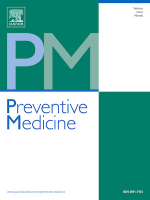
Preventive Medicine
Shaping tomorrow's public health through rigorous research.Preventive Medicine is a premier academic journal published by Academic Press Inc Elsevier Science, renowned for its influential contributions to the fields of Epidemiology and Public Health. Since its inception in 1946 and through its dedicated issues leading into 2024, the journal has established itself as a leading platform for cutting-edge research, boasting impressive Scopus rankings, with a notable Q1 status across relevant categories. This journal provides an essential forum for scholars, practitioners, and policy-makers interested in the prevention of diseases and the promotion of health within populations. With each issue, it disseminates valuable insights on preventive strategies, health behaviors, and epidemiological trends, making it crucial for anyone invested in the advancement of public health sciences. The journal does not offer open access options, ensuring that content remains relevant and targeted to its scholarly audience. Given its valuable contributions and recognition in the academic community, Preventive Medicine continues to play a pivotal role in shaping evidence-based approaches to health promotion and disease prevention in modern societal contexts.
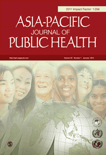
Asia-Pacific Journal of Public Health
Fostering collaboration to enhance community health.Asia-Pacific Journal of Public Health, published by SAGE Publications Inc, is a leading platform for disseminating scholarly research in the field of public health. With an impressive scope that spans from the late 1980s to the present, the journal offers a wealth of articles that address critical issues faced by diverse populations in the Asia-Pacific region. Categorized in the Q3 quartile for both Medicine (miscellaneous) and Public Health, Environmental and Occupational Health, it holds a significant position within its field, ranked 310 out of 665 in the Scopus database. Researchers and professionals have access to valuable insights that inform public health policy and practice, making this journal an essential resource for those aiming to enhance health outcomes in the region. While not currently open access, the journal's rigorous peer-review process ensures the integrity and relevance of its content. As the landscape of public health continues to evolve, the Asia-Pacific Journal of Public Health remains a vital resource for advancing knowledge, fostering collaboration, and promoting a healthier society.
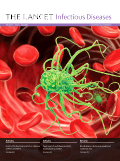
LANCET INFECTIOUS DISEASES
Bridging Research and Practice in Infectious DiseasesLANCET INFECTIOUS DISEASES is a premier journal published by Elsevier Science Ltd, dedicated to disseminating high-quality research and comprehensive reviews in the field of infectious diseases. Since its inception in 2001, the journal has become a pivotal resource in the medical community, recognized for its rigorous peer-review process and impactful contributions to public health. With an impressive Scopus rank of #2 out of 344 in the category of Medicine - Infectious Diseases, it consistently ranks in the 99th percentile, highlighting its importance and influence in shaping clinical and epidemiological research. The journal's commitment to advancing knowledge in infectious diseases is underscored by its Q1 quartile designation in 2023, affirming its status as a leading academic outlet. Although not an open-access journal, LANCET INFECTIOUS DISEASES provides essential insights for researchers, healthcare professionals, and students, bridging the gap between cutting-edge research and practical application in an increasingly interconnected world.
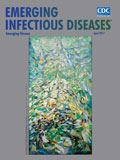
EMERGING INFECTIOUS DISEASES
Shaping the Future of Epidemiology and Public HealthEmerging Infectious Diseases, published by the Centers for Disease Control and Prevention, is a leading open-access journal that has been dedicated to the field of epidemiology, infectious diseases, and medical microbiology since its inception in 1995. With an impressive impact factor placing it in the Q1 quartile rankings for multiple categories including Epidemiology, Infectious Diseases, and Medical Microbiology, this journal serves as a vital resource for researchers, practitioners, and students dedicated to combating the challenges posed by emerging infectious diseases. The journal's distinguished Scopus ranks further highlight its global influence, ranking #10 in Epidemiology, #26 in Infectious Diseases, and #13 in Medical Microbiology, all within the top percentiles. Accessible and targeted, Emerging Infectious Diseases publishes seminal research and reviews that contribute to the understanding and management of infectious diseases, ensuring that critical insights reach a broad audience. The journal encourages contributions that advance the scientific community’s knowledge and responses to public health challenges.

Infectious Diseases and Clinical Microbiology
Innovating solutions for global infectious disease challenges.Infectious Diseases and Clinical Microbiology is a pivotal journal dedicated to advancing our understanding of infectious diseases through rigorous scientific research and clinical practices. Published by DOC DESIGN INFORMATICS CO LTD, this journal serves as a vital platform for researchers, healthcare professionals, and students keen on enhancing their knowledge of microbiological sciences and the clinical implications of infectious agents. With an ISSN of 2667-646X, it aims to disseminate significant findings in the field, enriching the scholarly dialogue surrounding infectious diseases. While currently operating under a traditional access model, the journal encourages global collaboration and knowledge sharing, striving to make a meaningful impact in tackling the challenges posed by infectious diseases. Its content aims to bridge the gap between laboratory research and clinical application, making it an essential resource in the contemporary landscape of global health.

Health Problems of Civilization
Bridging Research and Public Health StrategiesHealth Problems of Civilization, published by TERMEDIA PUBLISHING HOUSE LTD, is a premier Open Access journal dedicated to the exploration and analysis of health issues that arise in modern societies. With an ISSN of 2353-6942 and E-ISSN of 2354-0265, this journal focuses on interdisciplinary research that examines the relationship between lifestyle, environment, and health. Since its inception in 2014, it has embraced the Open Access model, ensuring broad dissemination and accessibility of its content to researchers, professionals, and students worldwide. Positioned to provide a critical platform for original research, systematic reviews, and innovative methodologies, Health Problems of Civilization aims to illuminate the pressing health challenges of our time and foster discussions that contribute to informed public health strategies. By fostering a scholarly dialogue, this journal plays a vital role in advancing knowledge and encouraging research in the field of public health, making it an invaluable resource for academia and professionals alike.

Archives of Public Health
Transforming research into impactful public health solutions.Archives of Public Health, published by BMC, is an esteemed open-access journal dedicated to advancing knowledge in the fields of public health, environmental health, and occupational health. With an ISSN of 0778-7367 and an E-ISSN of 2049-3258, this journal has maintained a prestigious position in its category, achieving a Q1 ranking in the latest 2023 metrics. Operating since 1996, and fully open access since 2011, it strives to disseminate pioneering research, innovative public health strategies, and critical reviews that benefit both academia and practice. The journal holds a notable Scopus rank of #192 out of 665, situating it in the 71st percentile within the medicine category. Based in the United Kingdom, its mission is to provide a platform for researchers, practitioners, and students to share and discuss groundbreaking findings that influence policy and practice in public health globally. As a vital resource for professionals dedicated to health improvement, the Archives of Public Health serves as an essential touchstone for contemporary public health discourse.
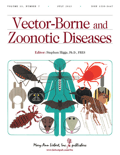
VECTOR-BORNE AND ZOONOTIC DISEASES
Advancing knowledge on the frontlines of infectious diseases.VECTOR-BORNE AND ZOONOTIC DISEASES is a prominent journal dedicated to advancing research in the fields of infectious diseases, microbiology, and virology, published by Mary Ann Liebert, Inc. With a rich history spanning from 2001 to 2024, this journal plays a critical role in disseminating cutting-edge research and insights regarding diseases transmitted by vectors and zoonotic pathogens. It has achieved notable rankings, including Q2 in the Infectious Diseases category and Q3 in both Microbiology and Virology as of 2023. The journal's emphasis on quality and relevance is further underscored by its established position—ranked 151st in Infectious Diseases and within the 43rd percentile in Virology according to Scopus. Although not an open-access journal, the publication ensures that its findings reach a broad audience of researchers, professionals, and students dedicated to tackling the challenges posed by these critical health issues. By providing a platform for innovative studies and discussions, VECTOR-BORNE AND ZOONOTIC DISEASES remains an essential resource for those at the forefront of disease research and public health strategies.